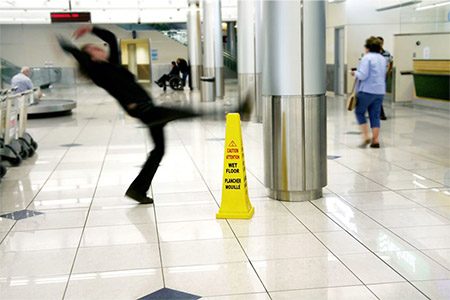Slip, Trip and Fall Accidents
[echo-content-down-arrow id=”temp-id” class=”temp-class” size=”35″ type=”epda-icon-arrow-point” animation_type=”slide_down” color=”dd3333″ duration_time=”10000″ bouncing_speed=”2000″ move_to=”” scrolling=”true” disable_bouncing=”false” disable_duration=”false” ]
Slip, Trip and Fall Accidents
 Premises liability occurs when there is a dangerous condition on a landowner’s property that has caused injuries, including fires and burns, falling objects, dog bites, unsafe furniture, unpermitted additions or improvements, and slip, trip and falls on commercial or residential property.
Premises liability occurs when there is a dangerous condition on a landowner’s property that has caused injuries, including fires and burns, falling objects, dog bites, unsafe furniture, unpermitted additions or improvements, and slip, trip and falls on commercial or residential property.
Landowners, lessors, managers, and occupiers have the duty to produce a reasonably safe environment for people who visit or reside on their premises, like customers, patrons, service personnel, or residents. Property owners should provide warnings when a hazard or dangerous condition develops on the premises until the hazard is remedied or repaired. If a landowner has knowledge of an adverse condition that could cause injuries and he or she refuses or fails to handle the matter, it’s going to become a legal liability should someone be hurt or killed thanks to the unrepaired danger. This might constitute negligence, which is the underly principle behind injury cases. Those that are broken by the failure of the landowner may pursue compensation for his or her damages in an injury claim or lawsuit against the responsible party or entity.
Liability can apply to any public or private property, including a residence, office buildings, restaurants, theaters, shopping malls, hotels, motels, dormitories, nursing homes, sports arenas, entertainment venues, nightclubs, grocery stores, apartment complexes, hospitals, parking structures, and more. Examples of unhandled and potentially dangerous property conditions include wet floors, spills on floors, broken tiles or flooring, poor or non-existent lighting in stairwells, hallways, or pathways, and other similar conditions which may result in a slip, trip or fall accident.
This does not mean that a landowner is responsible for every defect upon the premises, premises liability arises only if there is notice. However, a landowner’s lack of knowledge of the dangerous condition is not a defense. The landowner has an affirmative duty to exercise ordinary care to keep the premises in a reasonably safe condition, and therefore must inspect them or take other proper means to ascertain their condition. And if by the exercise of reasonable care, the landowner would have discovered the dangerous condition, the landowner is liable.
A landowner is not liable for damages caused by a minor, trivial, or insignificant defect in the premises. A vertical change in elevation of a walkway one inch or less is generally considered a trivial defect as a matter of law unless the totality of circumstances, i.e., other aggravating surrounding factors, indicates otherwise. Likewise, where danger is so apparent that a person could reasonably be expected to see it, the condition itself serves as a warning, and the landowner has no duty to warn of the condition.
FOCUSING ON COMPENSATION
Arthur Liberty will thoroughly investigate the facts of the accident or incident to determine the legal strategy to take in your particular situation. During your initial consultation, we will thoroughly discuss your case, including potential sources of information not readily apparent, including potential witnesses, video and audio recordings which must be acquired quickly before they are recorded over, law enforcement reports, and investigation whose initial conclusions can be altered if quickly dealt with early on. Arthur Liberty will try to answer all of your questions. He is committed to providing you with personal attention throughout the course of your claim and will pursue every possible means of compensation.
Arthur Liberty has the experience and knowledge needed when encountering any slip, trip and fall situation. With over three decades of experience, the firm has the resources and is the dedicated Santa Monica slip, trip and fall accident lawyer you need to follow through with your claim.